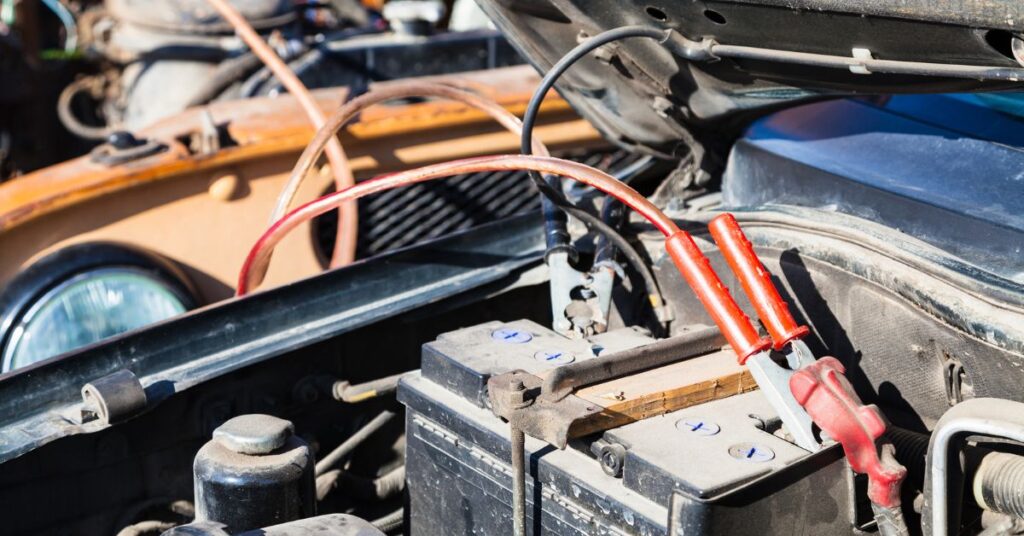
Table of Contents
Whether it’s the sweltering heat of summer or the bitter cold of winter, the weather and temperature can significantly affect your vehicle’s battery. This article will explain how hot and cold temperatures influence your car’s battery performance and longevity. Rest assured, if you need to test the strength of your battery or have a replacement installed, McCullough NAPA Auto Care is here to help.
How Hot Temperatures Affect A Car’s Battery
Atlanta’s hot summers can be challenging for us and our cars. This is especially true for their batteries. Here’s how high temperatures can negatively impact a car battery.
Accelerated Battery Fluid Evaporation
The liquid electrolytes in car batteries are prone to faster evaporation in hot temperatures. This is about more than losing fluid – it decreases the battery’s ability to hold a charge. Imagine your battery like a sponge. If it dries out, it can’t do its job effectively. This drying out can also cause internal structural damage to the battery, significantly reducing its lifespan and, in extreme cases, leading to battery failure.
Increased Corrosion Rate
The heat does more than just evaporate battery fluid. It also speeds up chemical reactions. This increases the corrosion rate, which is especially noticeable on the battery terminals and internal components, including rust eating away at the heart of your battery. This corrosion can obstruct the flow of electricity, diminishing the battery’s efficiency and reducing its useful life.
Battery Overcharging Risk
During hot weather, your car’s charging system might get fooled by the heat, leading to overcharging of the battery. Overcharging generates internal heat, which can cause significant and permanent damage to the battery when combined with high external temperatures. It’s a vicious cycle where the heat begets more heat, leading to a decline in battery health.
Vulnerability to Voltage Fluctuations
Heat can make your car’s battery more vulnerable to voltage fluctuations. This is particularly detrimental if your battery shows signs of age or weakness. Such fluctuations can result in inconsistent power delivery, affecting your vehicle’s overall performance and making your car feel less responsive and reliable.
How Cold Temperatures Affect a Car’s Battery
Just as extreme heat can be detrimental, cold weather poses significant challenges to your car’s battery. Here’s how cold temperatures can affect your car battery.
Slowed Chemical Reactions
The chemical reactions inside a car battery slow down in cold temperatures, reducing its efficiency. This is akin to the battery working overtime to produce the same amount of energy, which can lead to faster depletion. This can mean your car struggles to start on cold mornings, as the battery doesn’t have the same kick as in warmer weather.
Increased Thickness of Battery Fluid
The electrolyte fluid within your car’s battery thickens in cold weather like how oil will thicken in the winter. This thickening impedes the flow and effectiveness of the fluid, hampering the battery’s performance. The result is reduced power output, making the battery less efficient and reliable.
Reduced Charging Rate
Cold weather can dramatically slow the rate at which your battery recharges. This is due to the cold impacting the battery’s ability to accept and hold a charge, potentially leading to situations where the battery never fully charges, even with regular driving.
Shortened Battery Lifespan
Repeated exposure to cold temperatures can significantly shorten the lifespan of your car’s battery. This is especially true for older batteries, where the stress of operating in cold conditions exacerbates existing weaknesses or damage. Consequently, you may find yourself needing to replace your battery more frequently in prolonged periods of cold weather.
Battery Strength Testing & Replacement with McCullough NAPA
Understanding how temperatures affect your car’s battery is vital for maintaining your vehicle’s health. At McCullough NAPA Auto Care, we offer professional battery strength testing and replacement services. Typically, car batteries last between 3 to 5 years, but this can vary based on environmental conditions and usage. If you’re experiencing battery issues or it’s been a few years since your last replacement, it’s a good idea to have it checked. We can install a replacement battery to ensure your vehicle is ready to face any weather conditions.
Schedule an appointment today for a battery check-up and stay ahead of battery troubles, no matter the season.
FAQ About How Temperature Affects Car Batteries
Temperatures above 122°F (50°C) are considered too hot for a car battery and can lead to accelerated fluid evaporation and increased corrosion rates.
When a battery gets hot, it can experience accelerated fluid evaporation, increased corrosion rates, a higher risk of overcharging, and vulnerability to voltage fluctuations.
Batteries fail more quickly in hot climates due to accelerated fluid evaporation, increased corrosion, and potential overcharging, all of which can reduce the battery’s lifespan and efficiency.
Yes, car batteries tend to go bad faster in hot weather. The heat accelerates the evaporation of battery fluid and increases the rate of corrosion, leading to a reduced lifespan.
Yes, cold weather can ruin batteries. It slows down chemical reactions within the battery, reducing its efficiency and potentially leading to permanent damage, especially in older batteries.
To keep your car battery from dying in cold weather, regularly check its charge level, keep connections clean, park in a garage if possible, and consider using a battery warmer or insulated blanket.
Yes, cold weather can drain your battery faster. It causes the battery to work harder to produce the same amount of energy, leading to quicker depletion.

